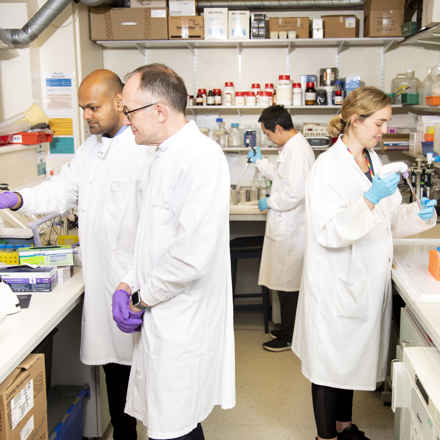Helping keep mitochondria healthy to keep macula cells alive

Prof Andrew Dick, University of Bristol - £243,732
This project will investigate two molecules involved in energy production and immunity in the cells of the macula. We know from a previous Macular Society funded project at Bristol University that the loss of these molecules disrupts cell metabolism, and causes cell ageing and harmful inflammation - all of which are central to the progression of AMD. This research will look at how these molecules work in the cells and investigate whether, by introducing more of them, we could restore cell health.
What is the problem?
A layer of cells in the back of the eye called the retinal pigment epithelium (RPE) is key to maintaining the health of photoreceptors, the cells that sense light and send information to the brain. These RPE cells require a lot of energy and contain many mitochondria, which are the parts of the cells that produce energy. The high requirement for energy in the RPE can lead to mitochondria becoming damaged and result in the build-up of toxic waste which leads to inflammation, both of which are involved in the development of AMD.
What are they doing?
Professor Dick and his team are investigating two molecules called IRAK-M and IL-33. The project will investigate the changes in cells which are missing the genes that code for IRAK-M and IL-33, compared to normal cells. They will then re-introduce the IRAK-M and IL-33 genes to understand how these molecules interact in the cells.
The second stage of research will involve introducing the IL-33 and IRAK-M genes into the eyes of mice to see whether this can stop or slow the damage that can lead to AMD.
How can this help?
This work aims to understand better how disruption to energy production and inflammation may lead to AMD, so that we can learn how to stop it progressing, especially in early AMD before sight is lost.
Want to know more?
To learn more about Professor Dick's research, please see the video below.
See our other projects
Since 1987 the Macular Society has invested around £10 million in over 100 research projects.
Explore more research
Beating macular disease through funding medical research and improving the lives of those living with macular disease.
Get the latest research news from the Macular Society
To hear about life-changing research and treatments, subscribe to our monthly enewsletter today. Together we can Beat Macular Disease.
Sign up to our free email newsletter



